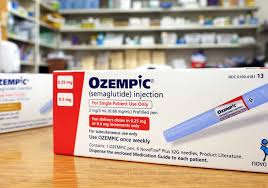As the calendar pages flipped to 2024, many
Americans hoped for a new year marked by fresh beginnings and financial
stability. Instead, they were greeted with a harsh reality: a wave of drug
price hikes that swept across the pharmaceutical landscape, engulfing over 700
medications within the first two weeks of January. This price gouging spree
included popular drugs like Ozempic and Mounjaro, leaving patients gasping for
air in a system seemingly choked by greed.
The median increase of 4.5% might seem innocuous
at first glance, barely exceeding December's inflation rate. However, beneath
the surface lurks a disturbing truth: for some medications, the price hikes
went far beyond a gentle nudge. Certain drugs saw their costs balloon by 10% or
more, a gut punch for patients already struggling to afford necessary
medication.
Among the most notorious price jumps were those
faced by users of Ozempic and Mounjaro, both GLP-1 receptor agonists primarily
prescribed for type 2 diabetes. However, their off-label use for weight loss
has surged in recent years, fueled by social media trends and celebrity
endorsements. This surge in demand, coupled with limited generic competition,
has created a breeding ground for predatory pricing by manufacturers. Ozempic's
monthly cost climbed 3.5% to nearly $970, while Mounjaro ascended 4.5% to a
staggering $1,070.
These price hikes are not merely abstract
numbers on a spreadsheet; they translate to real-world consequences for
millions of Americans. For individuals without robust insurance coverage, these
medications can become prohibitively expensive, forcing them to choose between
their health and financial stability. Diabetics might have to ration their
insulin, leaving them susceptible to serious health complications. Cancer
patients might be forced to abandon critical treatments, jeopardizing their
fight against the disease.
The rationale offered by drugmakers for these
price hikes is a predictable litany of "market conditions" and
"inflation." However, this explanation rings hollow when one
considers the obscene profit margins already enjoyed by pharmaceutical giants.
In 2023 alone, the top 10 drug companies amassed a combined net income of over
$800 billion, a figure that dwarfs the meager increase in production costs cited
as justification for these price hikes.
Furthermore, the argument of inflation falls
flat when juxtaposed with the reality of generic medications. Prices for these
essential drugs, crucial for millions of Americans, remained largely stable
during this period. This stark contrast exposes the cynical manipulation of the
market by big pharma, exploiting captive audiences dependent on life-saving
drugs for exorbitant profit.
The ethical implications of this price gouging
are undeniable. It is a direct assault on the fundamental right to health,
turning essential medications into luxury goods accessible only to a privileged
few. The consequences go beyond individual suffering; they ripple outward,
eroding social cohesion and widening the chasm between the haves and have-nots.
This is not merely an economic or health issue;
it is a blatant display of corporate greed and unchecked power. The
pharmaceutical industry, shielded by a web of lobbying and political influence,
has effectively created a system where their profits reign supreme, regardless
of the human cost.
However, amidst the darkness, glimmers of hope
emerge. Public outrage over these price hikes is growing, fueled by patient
advocacy groups and a burgeoning movement demanding affordable healthcare.
Calls for increased regulation and price transparency are gaining traction,
putting pressure on lawmakers to address this systemic injustice.
The fight against drug price gouging is a
complex one, demanding a multi-pronged approach. We need government
intervention to implement stronger price controls and transparency measures. We
need to empower patients through education and advocacy, allowing them to make
informed choices and demand fairness. We need to foster innovation in the
pharmaceutical sector, encouraging alternative drug development models that
prioritize affordability alongside profit.
This is not an impossible battle. History is
replete with examples of people coming together to overcome seemingly
insurmountable challenges. The healthcare system, as it stands, is broken. But
amidst the cracks, the seeds of change are sprouting. It is time we nurture
those seeds, cultivate a system that prioritizes health over profit, and ensure
that medication becomes a right, not a privilege. Only then can we truly
swallow the bitter pill of the present and usher in a future where healthcare
is accessible and affordable for all.


.png)


No comments: